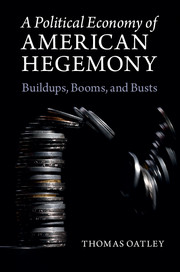Book contents
- Frontmatter
- Contents
- List of Tables and Figures
- Acknowledgments
- 1 The Political Economy of Imbalance
- 2 National Security Shocks and Military Buildups
- 3 Warfare, Welfare, and the Size of the American State
- 4 Military Buildups, Financial Power, and America's Postwar Booms
- 5 Deflecting the Costs of Adjustment
- 6 The Financial Consequences of America's Postwar Booms
- 7 The Political Economy of American Hegemony
- References
- Index
5 - Deflecting the Costs of Adjustment
Published online by Cambridge University Press: 05 February 2015
- Frontmatter
- Contents
- List of Tables and Figures
- Acknowledgments
- 1 The Political Economy of Imbalance
- 2 National Security Shocks and Military Buildups
- 3 Warfare, Welfare, and the Size of the American State
- 4 Military Buildups, Financial Power, and America's Postwar Booms
- 5 Deflecting the Costs of Adjustment
- 6 The Financial Consequences of America's Postwar Booms
- 7 The Political Economy of American Hegemony
- References
- Index
Summary
U.S. trade policy … ended up a weak and unwilling handmaiden to macroeconomics. It was forced into trying to do what macroeconomic policy could or would not do.
J. David RichardsonBuildup-driven booms have had a powerful impact on American foreign economic policy. In particular, they have caused the United States to use trade and exchange rate policy to try to pressure its largest trade partners to adjust their policies in order to narrow global imbalances. The United States has sought to deflect the costs of adjusting current account deficits the boom generates by manipulating its trade partner's economic and security dependence. The United States has pressured its partners to eliminate trade barriers, purchase more American products, revalue their currencies, and embrace more expansive monetary and fiscal policies. It has applied this pressure through bilateral talks and through multilateral negotiations in which it threatens to withdraw American security commitments and restrict access to the U.S. market unless governments agree to change policy. And though clearly all governments would always prefer that other states bear the costs associated with reducing global imbalances, the intensity of American pressure on its trade partners has been greatest in the midst of its economic booms.
American policymakers' efforts to deflect adjustment costs have occurred as a response to rising protectionism among manufacturing and in the halls of Congress that the boom generates. The strong dollar and rising imports generated by the buildup-induced boom place the American manufacturing industry under greater strain. As foreign competition intensifies at home and overseas, individual firms and the business associations that represent them begin to pressure Congress. The House and Senate hold hearings on America's declining competitiveness. Legislators hear testimony about how America's trade partners are cheating, using trade and exchange rate policy to give their producers an unfair advantage in global markets. Legislators introduce bills that threaten to restrict foreign access to the American market unless such cheating stops. Somewhat paradoxically, therefore, economic booms generate substantial protectionist activity within Congress.
- Type
- Chapter
- Information
- A Political Economy of American HegemonyBuildups, Booms, and Busts, pp. 107 - 126Publisher: Cambridge University PressPrint publication year: 2015



